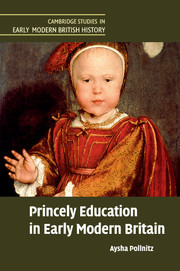Description
Princely Education in Early Modern Britain
Cambridge Studies in Early Modern British History Series
Author: Pollnitz Aysha
This book shows how liberal education taught Tudor and Stuart monarchs to wield pens like swords and transformed political culture in early modern Britain.
Language: English
Subject for Princely Education in Early Modern Britain:
Approximative price 32.87 €
In Print (Delivery period: 14 days).
Add to cart
Princely Education in Early Modern Britain
Publication date: 04-2017
Support: Print on demand
Publication date: 04-2017
Support: Print on demand
Approximative price 135.14 €
In Print (Delivery period: 14 days).
Add to cart
Princely Education in Early Modern Britain
Publication date: 05-2015
460 p. · 15.8x23.5 cm · Hardback
Publication date: 05-2015
460 p. · 15.8x23.5 cm · Hardback
Description
/li>Contents
/li>Biography
/li>
In the sixteenth century, Erasmus of Rotterdam led a humanist campaign to deter European princes from vainglorious warfare by giving them liberal educations. His prescriptions for the study of classical authors and scripture transformed the upbringing of Tudor and Stuart royal children. Rather than emphasising the sword, the educations of Henry VIII, James VI and I, and their successors prioritised the pen. In a period of succession crises, female sovereignty, and minority rulers, liberal education played a hitherto unappreciated role in reshaping the political and religious thought and culture of early modern Britain. This book explores how a humanist curriculum gave princes the rhetorical skills, biblical knowledge, and political impetus to assert the royal supremacy over their subjects' souls. Liberal education was meant to prevent over-mighty monarchy but in practice it taught kings and queens how to extend their authority over church and state.
Introduction; 1. 'Thys boke is myne': how humanism changed the English royal schoolroom, 1422–1509; 2. Chivalry, ambition, and bonae litterae, 1509–33; 3. Erasmus' Christian prince and Henry VIII's royal supremacy; 4. Educating Edward VI: from Erasmus and godly kingship to Machiavelli; 5. Fortune's wheel and the education of early modern British queens; 6. Education and royal resistance: George Buchanan and James VI and I; 7. Britain's lost Renaissance? The Stuart princes; Epilogue; Bibliography; Index.
Aysha Pollnitz was educated at the University of Sydney and Trinity College, Cambridge, where she was subsequently elected a Junior Research Fellow in Renaissance History. She has taught at Georgetown University, Washington DC and Grinnell College, Iowa. In 2016 she became an Assistant Professor of History at Rice University, Houston. Pollnitz has published essays on humanism, liberal education, Tudor and Stuart court culture, Shakespeare, and religious translation.
© 2024 LAVOISIER S.A.S.




